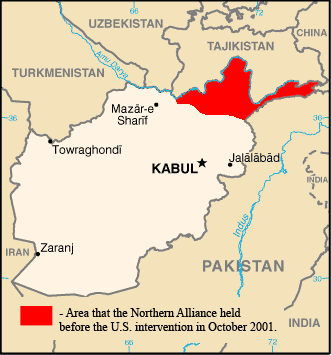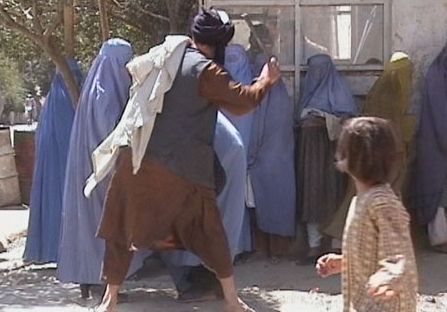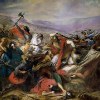![]()
Mon, March 01, 2010 | By Crethi Plethi
What if the Taliban Wins the War on Terror?
What if the Taliban wins the war on terror? In 2001, the US initiated “Operation Enduring Freedom” in Afghanistan, as aftermath of the 9/11 attacks on the World Trade Center, and turned it into a tremendous ongoing war effort in finding Osama Bin Laden, removing al-Qaeda from Afghanistan and destroying the Afghan Taliban regime who supported Islamic terrorist groups and offered them a safe haven. The Taliban regime was quickly ousted and al-Qaeda presence in the country deminished, but Osama Bin Laden remained unfound. This war has turned into an ongoing coalition conflict (when NATO took control over the ISAF mission in 2003) with Taliban groups all over Afghanistan especially in the dangerous south region, in North-West Pakistan and in the Pakistani province of Waziristan. Afghan president Hamid Karzai is now trying to persuade Taliban leaders to start peace talks, because he knows that in time the NATO and US troops will leave the country and focus their attention to a different and more challenging threat, a nuclear Iran. So, what will happen with Afghanistan if an undefeated Taliban is unwilling to start dialogue with the Afghan government and wins the war on terror? Let’s go back in history and see what the Taliban, or “the Islamic Emirate of Afghanistan,” had in mind for the people of Afghanistan when they came to power in 1996 and took control of nearly 90% of Afghanistan and turned it into a middle ages society until the 2001 war with the domestic Northern Alliance and the foreign forces during Operation Enduring Freedom. Let this be a warning for everyone of us and remember what Islam has in mind for the rest of our world.
The first Taliban Edicts
The Taliban (plural form of talib meaning “Student of Islamic Knowledge”) came to power in 1996 when Afghanistan was perhaps the poorest and most war-torn country on earth. What was the Taliban’s priority in this situation? Did they invest in developing agriculture, irrigation systems, economy, health care and social justice? Dit they build schools, hospitals, roads and utilities such as electricity, natural gas, water, sewage and telephone services? Did they establish a modern and prosperous islamic state? No, they didn’t.
Instead, one of their first Islamic edicts based on Shari’a law explains it all. This edict was proclaimed in december, 1996 by the “General Presidency of Amr Bil Maruf. Kabul December 1996.”
- To prevent sedition and female uncovers (Be Hejabi). No drivers are allowed to pick up women who are using Iranian burqa. In case of violation the driver will be imprisoned. If such kind of female are observed in the street their house will be found and their husband punished. If the women use stimulating and attractive cloth and there is no accompany of close male relative with the, the drivers should not pick them up.
- To prevent music. To be broadcasted by the public information resources. In shops, hotels, vehicles and rickshaws cassettes and music are prohibited. This matter should be monitored within five days. If any music cassette found in a shop, the shopkeeper should be imprisoned and the shop locked. If five people guarantee the shop should be opened the criminal released later. If cassette found in the vehicle, the vehicle and the driver will be imprisoned. If five people guarantee the vehicle will be released and the criminal released later.
- To prevent beard shaving and its cutting. After one and a half months if anyone observed who has shaved and/or cut his beard, they should be arrested and imprisoned until their beard gets bushy.
- To prevent keeping pigeons and playing with birds. Within ten days this habit/hobby should stop. After ten days this should be monitored and the pigeons and any other playing birds should be killed.
- To prevent kite-flying. The kite shops in the city should be abolished.
- To prevent idolatory [sic]. In vehicles, shops, hotels, room and any other place pictures/portraits should be abolished. The monitors should tear up all pictures in the above places.
- To prevent gambling. In collaboration with the security police the main centers should be found and the gamblers imprisoned for one month.
- To eradicate the use of addiction. Addicts should be imprisoned and investigation made to find the supplier and the shop. The shop should be locked and the owner and user should be imprisoned and punished.
- To prevent the British and American hairstyles. People with long hair should be arrested and taken to the Religious Police department to shave their hair. The criminal has to pay the barber.
- To prevent interest on loans, charge on changing small denomination notes and charge on money orders. All money exchangers should be informed that the above three types of exchanging the money should be prohibited. In case of violation criminals will be imprisoned for a long time.
- To prevent washing cloth by young ladies along with water streams in the city. Violator ladies should be picked up with respectful Islamic manner, taken to their houses and their husbands severely punished.
- To prevent music and dances in wedding parties. In the case of violation the head of the family will be arrested and punished.
- To prevent the playing of music drum. The prohibition of this should be announced. If anybody does this then the religious elders can decide about it.
- To prevent sewing ladies cloth and taking female body measures by tailor. If women or fashion magazines are seen in the shop the tailor should be imprisoned.
- To prevent sorcery. All the related books should be burnt and the magicians should be imprisoned until his repentance.
- To prevent not praying and order gathering pray at the bazaar. Prayer should be done on their due times in all districts. Transportation should be strictly prohibited and all people are obliged to go to the mosque. If young people are seen in the shops they will be immediately imprisoned.
Taliban history
Edited by Sajit Gandhi and Crethi Plethi
Formed in 1994, the Taliban began with only a few followers, mostly religious students who fought with the Mujahideen in the war against the Soviets and who were schooled in Islamic seminaries (madrasahs) in Pakistan. These students, or seekers, as they are referred to in the documents, wanted to rid Afghanistan of the instability, violence, and warlordism that had been plaguing the country since the defeat and withdrawal of the Soviets in 1989.
The departure of the Soviets, while welcomed by Afghans and the United States, left a political vacuum in Afghanistan. The resulting chaos and civil war led to the involvement of the United Nations which tried unsuccessfully to bring about political transition through the mission led by Special Representative Mahmoud Mestiri.
As a result, the civil war continued with Burhanuddin Rabbani and Ahmad Shah Massoud attempting to fill the government role, while the other warlord remnants of the Afghan resistance, such as the Uzbek commander Abdul Rashid Dostum, Pakistani-backed Gulbuddin Hekmatyar, and Ismail Khan, remained unwilling to cede any power or make concessions that could have resulted in a peaceful solution.
Consequently, outside forces saw instability in Afghanistan as an opportunity to press their own security and political agendas. Among them were terrorist groups such as Osama Bin Laden’s al-Qaeda network and states such as Pakistan, Iran, Russia, and India. Initially, the Pakistanis supported the Pashtun-Islamicist Gulbuddin Hekmatyar, an incompetent commander from the Mujahideen days, in order to have influence over the Afghan political landscape. When Hekmatyar failed to deliver for Pakistan, the Pakistani administration began to support a new movement of religious students known as the Taliban.
As history shows, Pakistani authorities discovered they had made a blunder. The Taliban were not only uncontrollable, but unpredictable as well. In certain instances the Taliban would declare their desire for peace, willingness to work with the UN, and desire for a non-military solution for Afghanistan, then state that “anyone who gets in our way will be crushed.”
It soon became clear that Taliban rule was detrimental to Afghan and international security, as evidenced by their sanctioning of continuing narcotics production -despite its un-Islamic quality- and shelter for al-Qaeda and other terrorists, thus resulting in the 9/11 attacks on the World Trade Center. This is the future for the world if the Taliban wins the war on terror.
Taliban, Sharia and Women Rights
source: Sarasota Herald Tribune.
In 1996, when the Taliban came to power, they imposed a strict version of islamic rule over Afghanistan and women were the target of most of the Taliban’s Edicts. The 750.000 remaining residents of Afghan capital, Kabul, listened to the Radio Shariat Broadcasts, fearing to miss a proclaimed edict which could mean a severe penalty by the religious police. The Taliban closed hospitals, prevented polio vaccination and women weren’t allowed to be helped by a male doctor.
The Taliban says women have to be hidden, otherwise they tempt men. Women were not allowed to go to school or work or to travel alone. People had to paint their windows black, so passers-by could not see the women inside. Women had to wear the Burqa and white socks were forbidden, because they attract male attention. Paper bags were forbidden also, because discarded pages of the Koran could be found in recycling bins and could transform into a paper bag. Flying kites could interfere with prayers, so they were outlawed as well. Soccer, non-Islamic music, photography and videos were considered against islam and forbidden by Taliban.
Mainstream Islamic scholars have denounced the Taliban’s decrees as backward and having little to do with religion. But Islamic law (Shari’a), based on Koran, tracts and religious interpretations, is interpreted by scholars and judges whose opinions often diverge drastically. And the Taliban are serious about their edicts. They had set up a religious police force that roamed the streets of Kabul looking for offenders. Women who were caught have been beaten publicly. A girl who refused to marry the man her family choose for her, but wanted to marry the man she loved instead, was sentenced to five years in jail.
Taliban and minorities
Source: India News Online; may 28, 2001.
The Taliban had no respect for Afghan’s cultural heritage, other beliefs or minorities. They destroyed for example two enormous ancient Buddhist sculptures in Bamiyan province. Temples and Hindu property were looted and burnt in Kabul, Kandahar and Jalalabad.
In yet another outrageous act during their rule, Afghanistan’s fundamentalist Islamic regime has prescribed measures that would further isolate the country’s Hindu minority and severely restrict their rights. This move has evoked an international outcry and has been condemned by Government of India. The tiny Hindu population numbering no more than 3,000 to 5,000, has been asked by the fundamentalist Taliban regime to wear a yellow cloth to identify themselves and follow the shariat or face prosecution. In a decree the date of enforcement of which is yet to be announced, the Taliban has asked the Hindus to put a metre yellow cloth on their houses so that their identity is known. The Hindus and Muslims under this “fatwa” cannot live in the same house, Hindus cannot build prayer houses. Places of worship once destroyed cannot be rebuilt, Hindu men cannot wear turbans. Hindu women should wrap their body with a big yellow “chadder” with two small holes near the eyes, Hindu women can go to market but they should wear an iron necklace and their body should be wrapped in a yellow chadder.
Like the Muslim women, the Hindu women are barred from employment and educational opportunities and now the Taliban has introduced new measures to separate the community from the rest of the population.
The Taliban edict is being compared by political observers to that of the Nazis before the Second World War when Jews were made to wear yellow stars of David, and the apartheid policy of the racist South Africa regime that forced the blacks to carry identity cards outside their ghettos in violation of human rights.
Even the plight of Afghanistanis is no better. Women have to live like slaves. Educational institutions are closing down fast. In a country which until recently considered enlightened in their treatment of women, today girls are not even permitted to attend schools or be treated by male doctors. Women have been banned from practising all professions including medicine.
This is what the Afghan people are facing if the Taliban wins the war on terror. What will happen with the rest of the world when facing a strong and revived Taliban with it’s backward islam and hate against western values and zionist presence in Israel?
The Islamic world did not condemn the Taliban’s extremism or the Taliban’s interpretation of Shari’a law. And neither Syria, Pakistan, Saudi Arabia or Arab Gulf states have ever issued a single statement or spoken out on behalf of the Afghan women, or the need for women’s and children’s education, and human rights in Afghanistan.
Remember this and know Islam in its purest form.



 RSS
RSS














RT @CrethiPlethi: What if the Taliban wins the war on terror? #israel #afghanistan #taliban #tcot #jcot http://j.mp/cJ6rJ1
[…] music drum. … chooled in Islamic seminaries (madrasahs) in Pakistan…. View post: What if the Taliban Wins the War on Terror? Tags: children, family, head, Music, pakistan, playing-, systems, taliban […]
Bible says.. A woman who does not cover her head, shave her head off. Ck it out
What point are you trying to make here?
That the New Testament is a harsh book and calls to and justifies the same treatment and discrimination of women as we see in Islamic civilization?
That Christianity and Islam are just as bad or good as the other?
That the Quran and the Bible both create medieval societies?
That the Christians are just as bad or good as the Taliban?
????
First of all, let’s read all of the bible verses in their context as they’re written (you can find them in 1Corinthians 11:3-16, NIV). The verses you’re referring to are:
“If a woman does not cover her head, she should have her hair cut off; and if it is a disgrace for a woman to have her hair cut or shaved off, she should cover her head.”
Secondly, these verses are referring to women who are in prayer or prophesying. In other words, who are dealing with spiritual matters before God.
What do these verses mean? Many people think that the Apostel Paul is speaking about physical coverings in these verses, such as a veil. Some Christians believe he is, others believe Paul isn’t, but the fact is that the Apostel Paul is not speaking about physical covering of the women in daily life and he is also not speaking about physical covering in church either (“for long hair is given to her as a covering”). So, these verses are speaking more of spiritual things, rather than the physical and the meaning of these verses goes far deeper than merely putting a veil on a women’s head.
The covering is not a veil that a woman wears on the head, but an attitude that someone has toward the one who is in authority over him or her. The veil (or long hair) would merely be the physical expression of that during prayer or prophesying (spiritual matters).
But someone could argue about this of course.
So, let us look at the facts. No doubt, our Western society is far from perfect. But… in our western (judeo-christian) civilization:
– women have the same rights as men;
– women are equal to men;
– women are treated the same way as men;
– women are respected the same way as men;
– women take part in society the same way as men…
And in any case if there’s discrimination or abuse or mistreatment of women in our western society, than women have all legal opportunities (given by our courts and constitutions) and with the help of our society, media and politicians to expose and to correct the discriminating and illegal practices in all cases.
But maybe the most important and significant fact to mention is:
“Any woman living in a Western democracy is given the right and is free to say what she wants, to choose what she believes in, to wear what she likes, to learn what she wants and to go where she wants, to marry the man who she loves and to live like she wants.”
In many Islamic countries (Iran, Afghanistan, Atjeh Indonesia, Saudi Arabia, Jemen, Sudan) women cannot choose whether she wants to wear a veil or not. They have no choice, they are forced by Islamic Shari’a law to cover themselves. I call this religious totalitarianism (or Islamic totalitarian rule). In Western countries women have the right to make their own choices (although many Islamic families don’t allow it in Western society either).
I hope all can see the difference to what the Taliban stands for and our Western civilization.